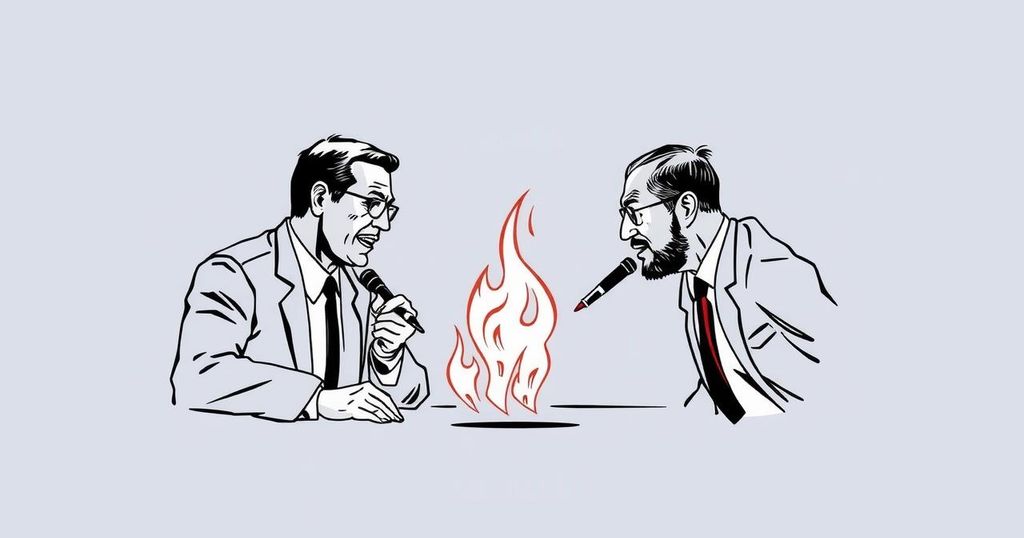U.S. officials express skepticism about achieving a ceasefire in Gaza before the upcoming presidential election, while showing slightly more optimism for negotiations between Israel and Hezbollah in Lebanon. Despite ongoing diplomatic efforts, there are significant doubts about the potential for success as Prime Minister Netanyahu may await the election results before making decisions. Protests during political events highlight the conflict’s contentious nature in U.S. politics.
American officials express skepticism regarding the potential success of a last-minute diplomatic effort aimed at establishing a ceasefire in Gaza before the upcoming U.S. presidential election on Tuesday. Prime Minister Benjamin Netanyahu of Israel appears to be waiting to see the outcome of the election before making significant decisions. Meanwhile, optimism has risen slightly regarding a potential resolution to cross-border violence between Israel and Hezbollah in Lebanon, with the country’s Prime Minister Najib Mikati indicating that discussions could be nearing a successful conclusion. “ We are doing our best and are optimistic that within the next few hours or days we will have a ceasefire,” Mr. Mikati stated during an interview on Wednesday. Within the White House, any progress toward reducing tensions in the region would be viewed positively. Nonetheless, officials believe Netanyahu is inclined to postpone major diplomatic moves until after the U.S. election, a sentiment that has been prevalent in the Biden administration. CIA Director Bill Burns recently traveled to Cairo for discussions related to the ongoing conflicts in Gaza and Lebanon, meeting with Egyptian President Abdel Fattah El-Sisi. Concurrently, U.S. envoy Amos Hochstein and Middle East Coordinator Brett McGurk are engaged in talks in Israel focused on hostage negotiations, ceasefire prospects, and discussions concerning Iran, all under the United States’ policy of “de-escalation supported by deterrence.” Netanyahu emphasized the necessity for Israel to have the capability to enforce a prospective ceasefire in Lebanon to safeguard against threats. “Prime Minister Netanyahu made it clear that the main point is not this or that agreement on paper, but Israel’s ability and determination to enforce the agreement and thwart any threat to its security from Lebanon, in a manner that will return our residents securely to their homes,” a statement from his office outlined. Despite these diplomatic efforts, there is a prevailing pessimism regarding the likelihood of reaching a substantial agreement before the election, which may allow the conflict in Gaza to linger in the background during this crucial political period. Vice President Kamala Harris faced protests at a campaign event, underscoring the contentious nature of the Middle Eastern conflict in domestic politics. As U.S. officials seek to finalize a resolution ahead of the election, they maintain a cautious sense of optimism regarding a new proposal involving a month-long ceasefire in Gaza in exchange for the release of hostages. After previous unsuccessful negotiations, there is a belief that new developments, particularly following the death of Hamas leader Yahya Sinwar, might provide an opportunity for progress. However, outstanding issues remain regarding the specifics of hostage and prisoner exchanges, and Hamas continues to express reluctance towards any arrangement that does not secure a permanent ceasefire. In Lebanon, with Israel actively targeting Hezbollah, U.S. diplomats endeavor to leverage a diplomatic solution to halt the violence. After discussions with Hochstein, Mr. Mikati revealed his optimism regarding achieving a ceasefire with Hezbollah soon. Nonetheless, the Israeli government and the White House have tempered expectations regarding reported ceasefire draft proposals that have emerged in media circulation, asserting that they do not accurately reflect the current negotiation circumstances.
The article discusses the complex political situation surrounding the ongoing conflicts involving Israel, Gaza, and Hezbollah in Lebanon. The U.S. government officials are making a final diplomatic push to broker a ceasefire before the U.S. presidential election, while also dealing with internal and external pressures stemming from the violence in the Middle East. With Netanyahu potentially delaying major decisions until after the election, and ongoing talks about a ceasefire that involve various international parties, the situation remains fluid and uncertain. The backdrop of the U.S. political environment complicates these diplomatic efforts, making it a critical area of focus for American officials.
In summary, American officials believe that the likelihood of successfully negotiating a ceasefire in Gaza before the upcoming U.S. presidential election is low. While there is some reason for optimism regarding negotiations between Israel and Hezbollah, significant challenges remain. Netanyahu’s approach suggests that key decisions will likely be postponed until after the election, contributing to the complex interplay between domestic political pressures in the U.S. and ongoing conflicts in the Middle East.
Original Source: www.cnn.com






